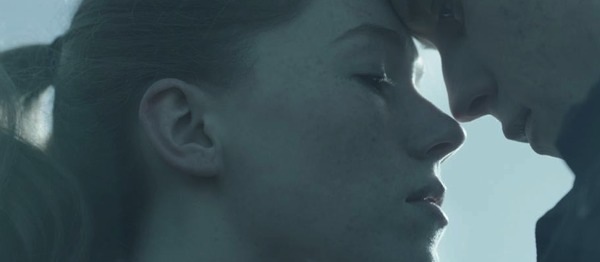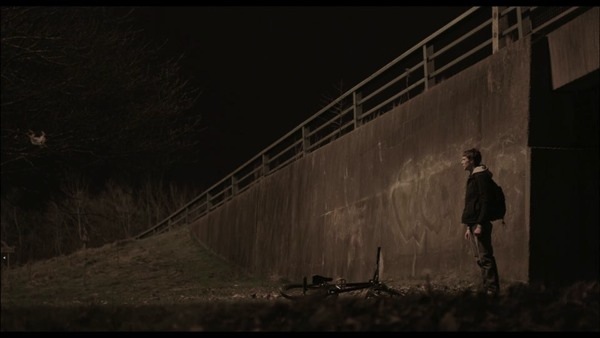It has been a rather long, almost interminable wait, but finally, Duane Hopkins’ sophomore feature will finally be making its world premiere debut at the Venice Film Festival. A visually engulfing multi-pov portrait that tapped into the motivations and behaviors of a teenage wasteland, while the nouveau British cinematic wave Cannes’ Critics’ Week selected Better Things showcased Hopkins’ skill set, the cloud formations were perhaps layers of blue, but the actual tone of the film was shades of dark sky grey. Calling his debut film “bleak” is an understatement.
Named as United Kingdom’s Shooting Star for 2013 (his range was on full display at last year’s TIFF — we highlighted his double dose), George MacKay has been padding his filmography with versatile roles including the seminal perf in Paul Wright’s For Those in Peril. Set in a dichotomous world where those with an already handcuffed future are further punished by hand me down larger economic and social ills, MacKay plays the street smart Tim in Hopkins’ Bypass. With the inner walls closing in, a world full of hope and filled with pain effectively tilts.
Premiering in the Orizzonti section at the 2014 Venice Film Festival, Bypass is also available in an exclusive limited window online screening offering via Sala Web – visit the box office. Here is my interview with the actor:
Eric Lavallee: I’m always impressed by young actors making what is a meticulous choice to include or concentrate on “edgier” auteur fare. In your case there is the period where you are learning the craft, then the period where you are working with acting legend peers (sometimes twice, or three times your age) and now, your current set of film choices: charged, uneasy, perhaps damaged characters. I’m specifically thinking of Paul Wright’s For Those in Peril (a rather brutal depiction of rejection, isolation and division) and and your next film, which premieres at the Venice Film Festival . Do you feel an added sense of pressure when taking on such roles from such filmmakers who have a distinct vision?
George MacKay: I don’t think there is necessarily an added pressure, there is always a level of pressure you usually put upon yourself to want to serve the story, but that said, a distinct vision is actually very helpful in focusing the anxieties you might have, and rather than feeling even more unsure and floundering, as long as you share an understanding with the director you can commit to trying to work in whatever way is required to get their vision across. But also the director’s vision goes far beyond what your job as an actor is, and it is important to remain focused in what you are doing so to give room for all the other elements around you such as lights, sound, editing and photography to do their work in getting across their and the directors vision too.
Lavallee: How did your involvement in Bypass come to fruition? Were you and Duane himself familiar with each other’s work, and was characteristics/traits was he specifically looking for in the character you portray, Tim? How did you prepare for the role?
MacKay: I first met Duane during my second audition for Tim; before reading the script I hadn’t seen any of Duane’s other work, but after reading Bypass I watched Better Things and thought it was wonderful, and watching the film really helped me to get a sense of the type of aesthetic and use of sound the film might have. I think Duane and I met broadly as people first, and it was important for him to get a sense of me as me, as much as an actor auditioning for the role. Finally we spent a good few hours together one day getting to know each other and ways in which we wanted to experiment working. I think it was important to Duane that despite the hardships of his environment Tim had a sensitivity to him and how that affected his actions, and the way he deals with them was vital to the story and something Duane wanted to explore. In preparing for the role Duane and I kept up a long dialogue during pre production, and Duane was incredibly involving in the process, which was brilliant and really made me feel part of the production. I think it was important to both of us that there was a slightly unconscious aspect to the performance and process and so being involved as much as possible really helped that.
Lavallee: Could you discuss Duane’s directing approach … was the character workshopped prior to filming, was there a detailed backstory to Tim (in particular the importance of family) and how did that inform your performance?
MacKay: We talked a lot about Tim, and however simple that sounds, it was very important to us. Duane was very open and encouraging about experimenting with different ways in creating the character, so it was a real melting pot all sorts, from creating backstory as well as rooting Tim in real people or experiences. What was exciting about how involving the process was was the fact that real life and story seemed to become very applicable to each other. As all, and any humans are complex and layered, Duane and I wanted to be as detailed as possible; that level of detail was something that was strived for across the whole production not just Tim.
Lavallee: We’ve become accustomed to working class since Kitchen sink realism in Brit cinema, in particular, this overall sense that the next of kin are dead set in repeating the errors of generations past. Could you describe Tim’s quest to undo this is preordained path?
MacKay: Tim is of a disposition that is not befitting his environment; his sensitivity and morality make his existence within his world very difficult for him as it affects the decisions he makes, as well as the lasting effect they have on him. Tim recognizes the right and wrong in circumstances and situations and his struggle is in making the right decision for himself and his family on a practical level versus a moral one.
Lavallee: Finally, could you describe in a broader sense, the generation that Tim and Lilly belong to and how it might differ from previous generations. Is the desperation and hope still part of the daily discourse?
MacKay: Tim and Lilly come from a generation that is without the order of generations before it; and with that come positives and negatives. There is hope in the possibility of freedom and freewill without the pre determined nature of perhaps the character of Grandfather’s generation. However, without that structure provided there is a facelessness and lack of identity to the class and culture Tim and Lilly come from, and to be defined as undefined is a difficult place to be.
Duane Hopkins’ Bypass will premiere in the Orizzonti section at the 2014 Venice Film Festival.
George MacKay is currently filming Matt Ross’ Captain Fantastic (2015) and was recently seen in the Cannes Directors’ Fortnight selected Pride by Matthew Warchus.




